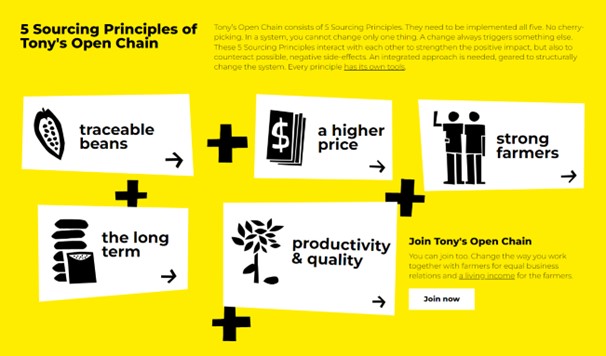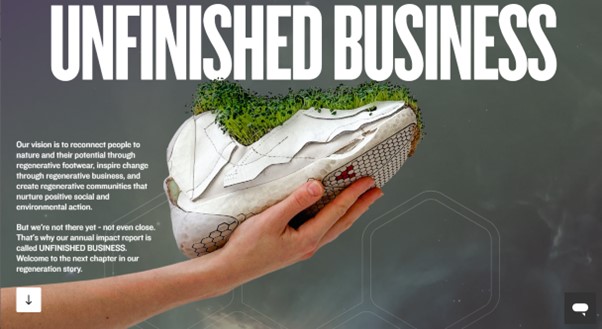Revolutionary businesses: setting new standards for a more regenerative future
Get inspired by four brands that lead the charge for positive change in their industries through regenerative practices.


Maya Madhusoodan
15 February 2024
4 min read
In our line of work, where we consult with our client partners on future opportunities and ways to grow their business, we’re always mindful of doing what’s right for both people and the planet. We aim to go beyond sustainability to regeneration. But I’d be lying if I said I didn’t have my own doubts about how these messages land. I’m a realist and I often wonder if large corporations are truly going to make the effort to reframe their vision of growth and include externalities into their plan.
But I’ve been proven wrong. It has been quite heartening and exciting to see the notion of ‘regenerative businesses’ accelerate over the last few years. I live in Singapore, where natural resources, including drinking water, are sourced from neighbouring countries. So, seeing brands like WhatIF Foods in the supermarket – offering plant-based products from regenerative crops – restores my faith that businesses do consider long-term wellbeing.
In our latest ‘What Matters’ report, we explore how businesses are not only meeting UN Sustainable Development Goals or making zero pledges but are going beyond that by designing regenerative systems. While the idea of reframing outdated systems may seem daunting, many responsible brands are leading the way, actively seeking out more circular or regenerative modes of operation. In this blog, we spotlight four brands that uphold their industries to higher standards. They do so not with pledges, but by ensuring their regenerative visions form the basis for designing all aspects of the business and the surrounding systems.
Fighting for sweet justice in chocolate: Tony Chocolonely
Exploitation and slavery are rampant in the food and farming industry. Tony’s Chocolonely has taken a bold stand to combat this injustice. They proudly declare their chocolate 100% exploitation-free, tackling the issue of slavery within the industry head-on. They communicate this stance through their unconventional chocolate shapes, that symbolise their commitment to tackling inequality.
Apart from promoting fair trade and fair employment practices, Tony’s has set itself five strict sourcing principles: sourcing traceable cocoa beans, paying a higher price to cocoa farmers, nurturing long-term partnerships with farmers (for a minimum of five years), supporting the professionalization of farming cooperatives and investing in improving quality and productivity. With these five principles Tony’s is dedicated to revolutionising the chocolate industry as a whole and that’s why they share them via their Open Chain initiative. As such, they advocate for fair practices to become the norm among chocolate manufacturers, regardless of their size. Or, in their own words: “so chocolate players big and small can make fair play their standard”.

Force of Nature’s regenerative meat mission
The meat industry is infamous for producing 14.5% of global greenhouse gas emissions. Meat businesses like Force of Nature offer a regenerative alternative to those seeking the nutritional benefits of meat while remaining conscious of their carbon footprint. Drawing inspiration from regenerative practices observed on ranches worldwide, the brand’s founders collaborate with a collective of land stewards, ranchers and farmers to create a positive impact on the planet. Their overarching mission is the accelerate the creation of a global regenerative supply network and restore regenerative principles as keystones of our agricultural systems.
Vivo Barefoot walks the talk with candid conversations on sustainable footwear
While the meat industry is anything but kind to our planet, neither is the fashion industry. Consider how shoes, especially running or training shoes, often have very short life cycles, contributing to waste. While many leading brands like Nike and Adidas strive to use recycled materials to meet their sustainability goals, Vivo Barefoot stands out for their candid approach. They openly admit they’re not yet regenerative or sustainable but are committed to the journey. Their honesty is refreshing and courageous, demonstrating their eagerness to confront the challenges their industry tries to hide behind greenwashing claims. By initiating this conversation, they delve into the complexities of balancing profit with purpose and the paradox of regenerative growth. With roles like ’Regeneration Lead’ and ‘Chief Ecosystem Officer’, they are dedicated to finding meaningful solutions.

Huawei’ smart solutions for a brighter future
Huawei channels technology in service of the planet, from boosting agriculture to early forest fire detection. One notable initiative involves optimizing heating systems using AI technology. In many parts of the world, heating is supplied by centralised plants that serve entire neighbourhoods or cities, leading to rooms that are either too hot or too cold. In Harbin, China, Huawei ‘s smart heating solution fine-tunes these traditional systems, enhancing comfort, minimizing waste and ensuring optimal heating distribution across homes.

Another example is Huawei’s application of AI technology to enhance biodiversity in the Yellow River Delta National Nature Reserve in eastern China. This reserve is a crucial habitat for wetland species and migratory birds. Through the integration of AI and 5G cloud computing, Huawei improves biodiversity research and monitoring, boosting efficiency while preserving the delicate ecosystem. This advancement enables researchers to observe migratory bird patterns without disruption, demonstrating the utmost respect for nature.
What do all these brands have in common? It’s their strong vision, positive intent and dedication to solving problems deeply rooted in their industries. They are leading the way to positive change through breakthrough, regenerative approaches to business. Explore the underlying dimensions of this positive change and get inspired by our What Matters 2024 report.
What Matters 2024
The 2024 edition of our What Matters report has arrived. The report takes a clear stance for change driven by a call for urgency, as new research reports 8 out 10 people worldwide are worried about the future and feel brands need to take responsibility.